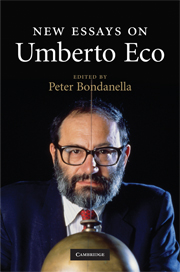Book contents
- Frontmatter
- Contents
- Notes on contributors
- Preface
- Acknowledgments
- 1 Eco and popular culture
- 2 Eco's semiotic theory
- 3 Eco's scientific imagination
- 4 From the Rose to the Flame: Ecos theory and fiction between the middle Ages and postmodernity
- 5 Eco's middle Ages and the historical novel
- 6 Eco and the tradition of the detective story
- 7 “The subject is in the adverbs.” The role of the subject in Eco's semiotics
- 8 Double coding memorabilia in The Mysterious Flame of Queen Loana
- 9 Eco and Joyce
- 10 Eco on film
- Selected bibliography on Eco
- Index
3 - Eco's scientific imagination
Published online by Cambridge University Press: 26 January 2010
- Frontmatter
- Contents
- Notes on contributors
- Preface
- Acknowledgments
- 1 Eco and popular culture
- 2 Eco's semiotic theory
- 3 Eco's scientific imagination
- 4 From the Rose to the Flame: Ecos theory and fiction between the middle Ages and postmodernity
- 5 Eco's middle Ages and the historical novel
- 6 Eco and the tradition of the detective story
- 7 “The subject is in the adverbs.” The role of the subject in Eco's semiotics
- 8 Double coding memorabilia in The Mysterious Flame of Queen Loana
- 9 Eco and Joyce
- 10 Eco on film
- Selected bibliography on Eco
- Index
Summary
As Umberto Eco has declared, “there is something artistic in a scientific discovery and there is something scientific in that which the naive call ‘brilliant intuitions of the artist.’ what they share is the felicity of Abduction” (Eco, The Limits of Interpretation, p. 159). No Italian novelist and thinker in recent years has contributed more to the crossing and redrawing of disciplinary boundaries than Eco, whose work strategically engages with transformative moments in the history and philosophy of science. Examples from Eco's writings – journalistic, literary, and academic – amply demonstrate his observation. Science, as both object of study and method of inquiry, plays an important role in his fiction, particularly in his first three novels – The Name of the Rose; Foucault's Pendulum; and The Island of the Day Before. while not as engaged with science as Eco's previous novels, Baudolino and The Mysterious Flame of Queen Loana nonetheless touch on scientific themes. In Baudolino a series of machines – a pump (to create a vacuum), mirrors of Archimedes (to set fire to attacking forces), a Dionysius ear (to overhear conversations) – are implicated in the mystery of the Grasal and the death of the emperor Frederick; in The Mysterious Flame of Queen Loana, yambo (a.k.a. Giambattista Bodoni), the novel's protagonist, suffers from a scientifically challenging event – a stroke that has left him without autobiographical memory. Thus, science serves as a focal point for all of Eco's fiction, just as his theoretical works take account of the state of scientific work on a number of topics.
- Type
- Chapter
- Information
- New Essays on Umberto Eco , pp. 34 - 49Publisher: Cambridge University PressPrint publication year: 2009



